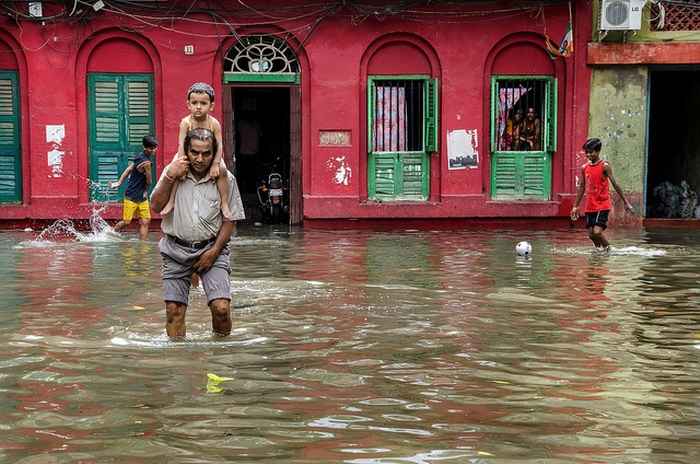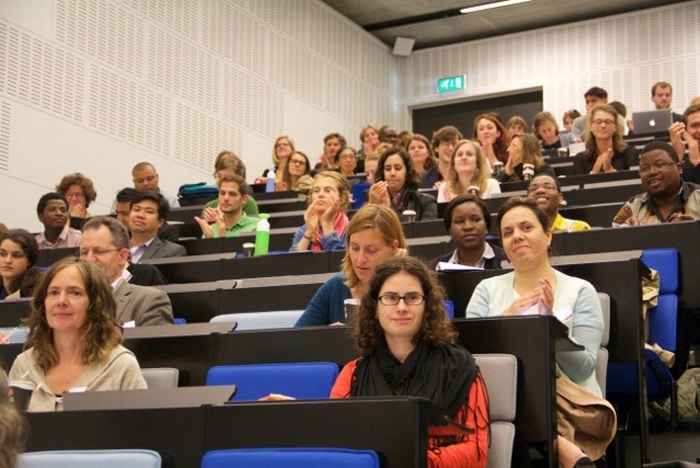Climate change- empowering developing countries in the climate debate

Joyeeta Gupta, professor of Environment and Development in the Global South at the Amsterdam Institute for Social Science Research and at the IHE Institute for Water Education in Delft, engages in the empowerment of developing countries in the climate debate.
Developing countries are the most vulnerable
Developing countries are affected most by climate change, yet they do not have the most influential position in the climate debate. Improving the relations between the poorest and the wealthy and formulating a critical message regarding environmental policies and human wellbeing is at the heart of the work of Gupta and her team. Their aim is to empower local people and developing countries with the knowledge and skills to strengthen their position in local and global negotiations on environmental and developmental policies.
The Survival Guide for negotiators
To strengthen the position of negotiators from developing countries, Gupta wrote the Survival Guide for Developing Country Climate Negotiators: ‘On behalf of my delegation…’ in 2000, which was translated into Spanish and French and which is still being used by negotiators:
‘… there is a constant surge of new negotiators who are actually primarily meteorologists, environmentalists, policymakers and scientists, who have to don the garb of a “negotiator” at the negotiations. The implicit understanding in many developing countries is that these experts must learn on the job. In the meanwhile, the negotiations continue at an unrelenting pace, making no allowances for the unprepared negotiator. Hence, this document provides … a backpacker’s guide to the negotiating context and … sums up the key problems faced by negotiators and ways to deal with these problems.’
Finding ways to influence policymaking
Prof. Gupta has experienced how difficult it can be to directly influence policymaking when it comes to climate change, but she is convinced that scientists need to keep communicating their critical message: ‘In the end you will be invited to panels and advisory boards and you will be heard.’
Policy briefs
One way of influencing policymaking is through writing policy briefs. Gupta and her team contributed to an international series of policy briefs (coordinated by Japan) on the Sustainable Development Goals (SDGs) that the United Nations adopted in September 2015. The SDGs are part of a new sustainable development agenda with the aim to end poverty, protect the planet, and ensure prosperity for all.
With an interdisciplinary team, Gupta wrote Sustainable Development Goals and Inclusive Development, which was presented to the United Nations. In this policy brief, Gupta and her co-authors advise to evaluate the goals and targets of policy against criteria for inclusive development, to build capacity for the most marginalised populations, to deal with root causes and to safeguard exceptional leadership to ensure successful implementation.
UN Environment – Global Environment Outlook
Gupta was nominated to chair the production of the sixth edition of the Global Environment Outlook (GEO-6), a comprehensive assessment of the state of the world’s environment. The assessment, produced by UN Environment, provides policymakers with trends and projections for air, climate, water, land and biodiversity and an outlook for the future. Gupta (co-nominated together with Paul Ekins, professor of Energy and Environment Policy at University College London) will work with hundreds of leading scientists from around the world to bring focus and scientific excellence to the process. This report will be provided to governments for their approval in 2019 and will hopefully stimulate action in their countries.

Conference on Sustainable Development Goals
In 2016 Gupta, Maarten Bavinck, John Grin and members of the Centre for Sustainable Development Studies organised a unique conference on the Sustainable Development Goals, where actors from the social sciences, policy circles and non-governmental organisations gathered in Amsterdam for three days to critically review the newly adopted goals and their potential for mobilising the world to create a more equitable and environmentally sustainable future. The conference discussed and developed strategies for future research, teaching and actions that will result from the establishment of these goals, targets and indicators.
Advisory role and training
Besides organising targeted publications and conferences, Prof. Gupta is also a member of the Advisory Council on International Affairs as well as vice chair of the Commission on Development Cooperation, a statutory body that advises the Dutch government on international policy. She is also on the board of supervisors of the Dutch Royal Tropical Institute and Oxfam NOVIB, where she offers academic advice on the design of their projects and programmes.
Inclusive research
In their projects, Gupta and her research group aim at collaborating with the potential users of their research right from the beginning. They believe that problems should be defined in collaboration with stakeholders and that the analysis should not only be critical but also constructive where possible, aiming to find ways to address these problems. Sometimes, this can mean that recommendations should not come as an afterthought but be part of the research design and that questions such as ‘who could gain from your research?’ should be posed from the beginning.
The idea is not just to analyse what causes marginalisation and exclusion, but also to actively engage in understanding when and under what circumstances governance and policy instruments can be designed in a way that can serve to ensure inclusive development. Prof. Gupta is convinced that this combination of basic and applied research is not contradictory, but is rather a sound and fruitful combination.